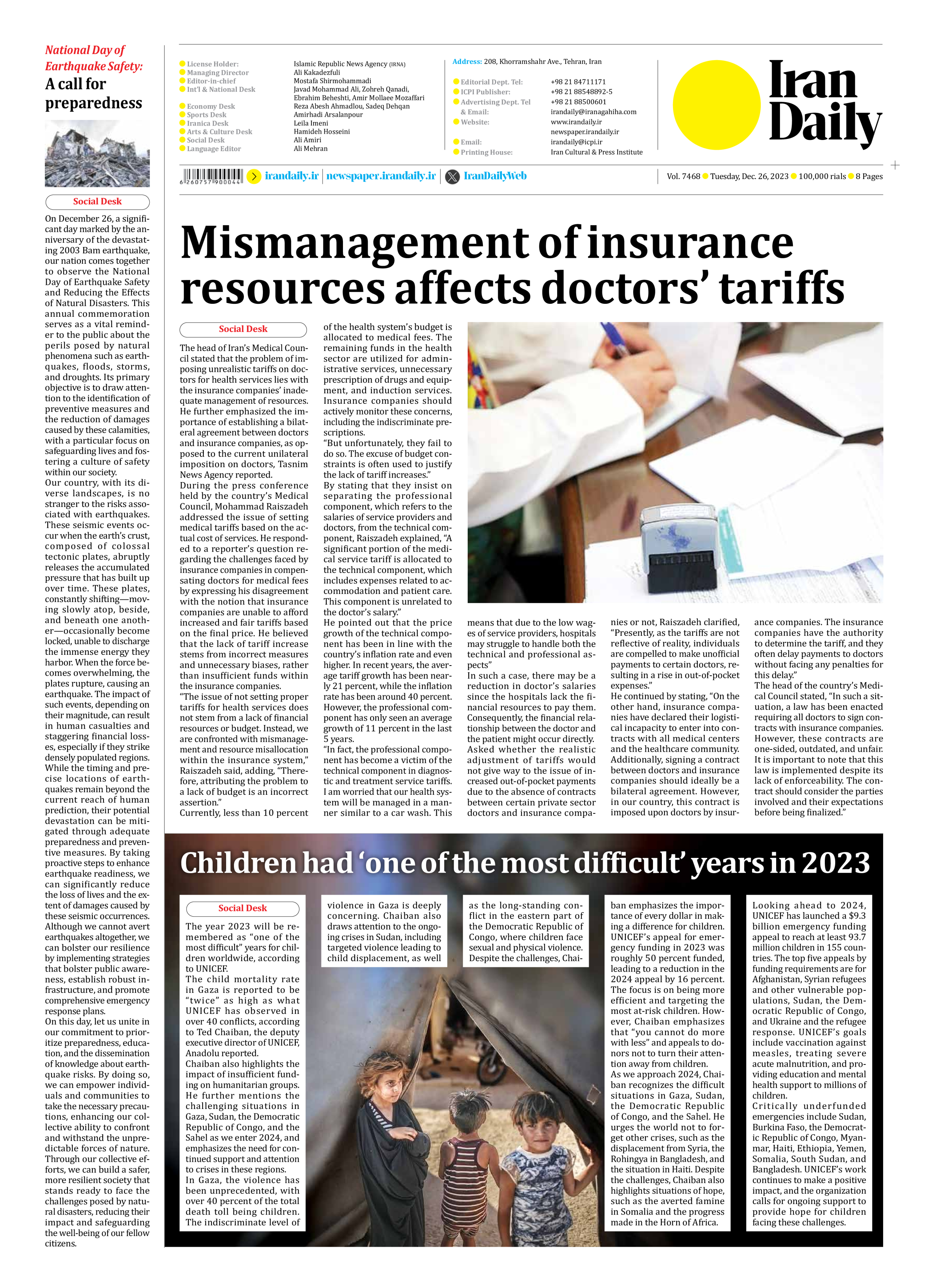
Mismanagement of insurance resources affects doctors’ tariffs
The head of Iran’s Medical Council stated that the problem of imposing unrealistic tariffs on doctors for health services lies with the insurance companies’ inadequate management of resources.
He further emphasized the importance of establishing a bilateral agreement between doctors and insurance companies, as opposed to the current unilateral imposition on doctors, Tasnim News Agency reported.
During the press conference held by the country’s Medical Council, Mohammad Raiszadeh addressed the issue of setting medical tariffs based on the actual cost of services. He responded to a reporter’s question regarding the challenges faced by insurance companies in compensating doctors for medical fees by expressing his disagreement with the notion that insurance companies are unable to afford increased and fair tariffs based on the final price. He believed that the lack of tariff increase stems from incorrect measures and unnecessary biases, rather than insufficient funds within the insurance companies.
“The issue of not setting proper tariffs for health services does not stem from a lack of financial resources or budget. Instead, we are confronted with mismanagement and resource misallocation within the insurance system,” Raiszadeh said, adding, “Therefore, attributing the problem to a lack of budget is an incorrect assertion.”
Currently, less than 10 percent of the health system’s budget is allocated to medical fees. The remaining funds in the health sector are utilized for administrative services, unnecessary prescription of drugs and equipment, and induction services. Insurance companies should actively monitor these concerns, including the indiscriminate prescriptions.
“But unfortunately, they fail to do so. The excuse of budget constraints is often used to justify the lack of tariff increases.”
By stating that they insist on separating the professional component, which refers to the salaries of service providers and doctors, from the technical component, Raiszadeh explained, “A significant portion of the medical service tariff is allocated to the technical component, which includes expenses related to accommodation and patient care. This component is unrelated to the doctor’s salary.”
He pointed out that the price growth of the technical component has been in line with the country’s inflation rate and even higher. In recent years, the average tariff growth has been nearly 21 percent, while the inflation rate has been around 40 percent. However, the professional component has only seen an average growth of 11 percent in the last 5 years.
“In fact, the professional component has become a victim of the technical component in diagnostic and treatment service tariffs. I am worried that our health system will be managed in a manner similar to a car wash. This means that due to the low wages of service providers, hospitals may struggle to handle both the technical and professional aspects”
In such a case, there may be a reduction in doctor’s salaries since the hospitals lack the financial resources to pay them. Consequently, the financial relationship between the doctor and the patient might occur directly.
Asked whether the realistic adjustment of tariffs would not give way to the issue of increased out-of-pocket payments due to the absence of contracts between certain private sector doctors and insurance companies or not, Raiszadeh clarified, “Presently, as the tariffs are not reflective of reality, individuals are compelled to make unofficial payments to certain doctors, resulting in a rise in out-of-pocket expenses.”
He continued by stating, “On the other hand, insurance companies have declared their logistical incapacity to enter into contracts with all medical centers and the healthcare community. Additionally, signing a contract between doctors and insurance companies should ideally be a bilateral agreement. However, in our country, this contract is imposed upon doctors by insurance companies. The insurance companies have the authority to determine the tariff, and they often delay payments to doctors without facing any penalties for this delay.”
The head of the country’s Medical Council stated, “In such a situation, a law has been enacted requiring all doctors to sign contracts with insurance companies. However, these contracts are one-sided, outdated, and unfair. It is important to note that this law is implemented despite its lack of enforceability. The contract should consider the parties involved and their expectations before being finalized.”







